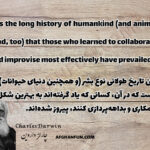Follow your bliss and the universe will open doors where there were only walls.
Joseph Campbell
Follow Your Bliss: Create Your Own Opportunities
دنبال شادی و لذت خود برو، و جهان درهایی را به رویت خواهد گشود، جایی که پیش از آن فقط دیوار بود.
جوزف کمبل
این جمله بر اهمیت پیروی از علایق و شادی درونی تأکید دارد. وقتی انسان به دنبال چیزی میرود که او را عمیقاً خوشحال میکند، جهان به طرز شگفتانگیزی مسیرهایی را پیش روی او قرار میدهد که شاید در ابتدا غیرممکن به نظر میرسیدند. مفهوم این جمله به قانون جذب و هماهنگی با انرژیهای مثبت نیز نزدیک است. یعنی وقتی انسان از روی علاقه و اشتیاق واقعی حرکت کند، موانع به فرصت تبدیل خواهند شد.
Хушбахтии худро пайравӣ кун, ва олам дарҳоеро мекушояд, ки дар он ҷо танҳо деворҳо буданд.
Ҷозеф Кэмпбелл
Ин ҷумла аҳамияти пайравӣ кардан аз хушбахтии ботинӣ ва шавқи ҳақиқиро таъкид мекунад. Вақте ки инсон бо дилу ҷон кореро мекунад, ки ӯро шод месозад, олам роҳҳоеро мекушояд, ки қаблан намоён набуданд. Ин маъно бо “қонуни ҷазб” низ иртибот дорад – вақте ки шахс бо ният ва нерӯи нек амал мекунад, монеаҳо ба имкониятҳо табдил меёбанд.
اتبع سعادتك، وسيفتح لك الكون أبوابًا حيث لم يكن هناك سوى جدران.
جوزيف كامبل
هذه العبارة تؤكد على أهمية اتباع الشغف الداخلي والسعادة الحقيقية. عندما يسعى الإنسان وراء ما يحبه بصدق، فإن الكون يستجيب له بطرق غير متوقعة، ويخلق له فرصًا جديدة بدلًا من العوائق. الفكرة تتماشى مع مفهوم “قانون الجذب”، حيث أن الطاقة الإيجابية التي يبثها الإنسان تجلب له نتائج إيجابية، مما يفتح له الأبواب التي كانت تبدو مغلقة.
Joseph Campbell’s quote, “Follow your bliss and the universe will open doors where there were only walls,” encapsulates a central theme in his work on mythology and personal fulfillment. Here’s an analysis of its key elements:
- Follow your bliss: Campbell often spoke about the importance of identifying and pursuing what truly brings you joy and fulfillment. “Bliss” here refers to a deep sense of purpose or passion that aligns with your authentic self. It’s not just about fleeting happiness but about engaging in activities or a life path that feels meaningful and energizing.
- The universe will open doors: This part of the quote suggests that when you align yourself with your true calling, opportunities and pathways that were previously invisible or inaccessible will become apparent. It implies a kind of synchronicity or alignment with the flow of life, where external circumstances begin to support your inner journey.
- Where there were only walls: Walls symbolize obstacles, limitations, or dead ends. Campbell is suggesting that what once seemed like insurmountable barriers can transform into gateways when you are true to yourself. This transformation is not just about external changes but also about a shift in perception—seeing possibilities where you once saw blockages.
Broader Implications:
- Mythological Context: Campbell’s idea of “following your bliss” is deeply rooted in his study of world myths, where heroes often embark on journeys of self-discovery and transformation. By following their true path, they overcome challenges and achieve a sense of unity with the cosmos.
- Psychological Perspective: From a psychological standpoint, this quote resonates with concepts like self-actualization (Maslow) and the idea that living authentically leads to a more fulfilling life. It suggests that when you are in tune with your inner desires and values, you are more likely to find success and satisfaction.
- Spiritual Interpretation: Spiritually, the quote can be seen as an encouragement to trust in a higher order or the natural flow of the universe. It implies that by aligning with your true self, you become a co-creator with the universe, attracting experiences and opportunities that support your growth.
Practical Application:
- Self-Reflection: To “follow your bliss,” you need to engage in deep self-reflection to understand what truly brings you joy and fulfillment.
- Courage and Trust: It requires courage to pursue your passion, especially when faced with societal expectations or fears of failure. Trusting that the universe will support you can be a powerful motivator.
- Action: Following your bliss is not a passive process; it involves taking proactive steps towards your goals, even when the path is uncertain.
In summary, Campbell’s quote is a call to live authentically and passionately, suggesting that such a life is not only more fulfilling but also more in harmony with the broader forces of the universe. It’s a reminder that obstacles are often illusions, and by pursuing what truly matters to you, you can transform your life in profound ways.
Joseph Campbell was an American professor, writer, and orator best known for his work in comparative mythology. He studied and compared myths and stories from around the world, finding common themes and patterns that appear across cultures and throughout history.
Here’s a breakdown of some key aspects of his life and work:
- Early Life and Education: Born in 1904, Campbell’s fascination with mythology began in his childhood. He studied literature at Columbia University and later pursued studies in medieval literature and Sanskrit in Paris and Munich.
- The Hero’s Journey: One of Campbell’s most significant contributions is the concept of the “monomyth” or “hero’s journey.” In his book “The Hero with a Thousand Faces,” he outlined the common narrative structure found in myths and stories worldwide, where a hero embarks on an adventure, faces challenges, and ultimately returns transformed. This concept has had a profound influence on storytelling in literature, film, and other forms of media.
- Comparative Mythology: Campbell’s work focused on comparing myths from different cultures to identify universal themes and symbols. He believed that myths serve a vital psychological and social function, providing insights into the human experience and our place in the universe.
- “Follow Your Bliss”: Campbell is also known for his famous quote, “Follow your bliss.” This idea emphasizes the importance of pursuing one’s passions and finding fulfillment in life, which resonates with many people seeking purpose and meaning.
- Influence: Campbell’s work has had a lasting impact on various fields, including literature, film, psychology, and religion. His ideas have influenced writers, filmmakers, and thinkers, and his books continue to be widely read and studied.
Some of his notable works include:
- “The Hero with a Thousand Faces”
- “The Masks of God” (a four-volume series)
- “Myths to Live By”
- “The Power of Myth” (a book based on his interviews with Bill Moyers)
Joseph Campbell’s work remains relevant today, offering insights into the human condition and the power of storytelling to shape our understanding of ourselves and the world around us.











